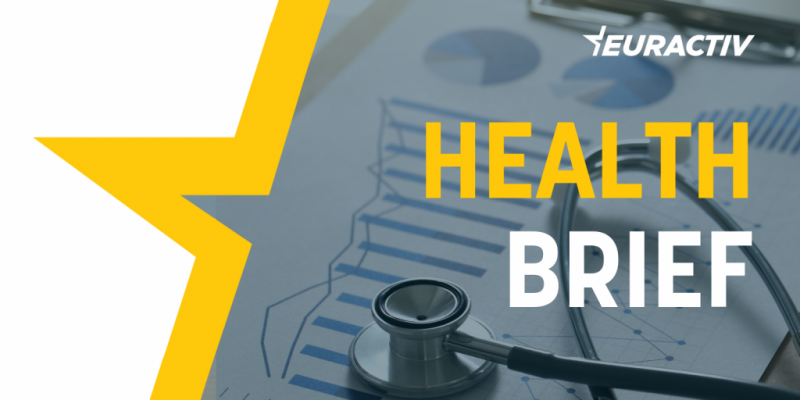Community-building initiatives aim to improve the well-being of European elders, who face unaddressed mental health challenges and increasing loneliness.
“Parrots are happier when they talk to other parrots,” Elizabeth Mestheneos, the former president of AGE Platform Europe, said in a speech at the kickoff event of the European Mental Health Week on Monday (22 May), referring to an experiment on communication and socialising.
AGE Platform Europe is an association that advocates for the inclusion of older people in EU policies.
The experiment she referred to was conducted by a group of researchers from Northeastern University, the University of Glasgow and the Massachusetts Institute of Technology, during which domesticated parrots were given the opportunity to speak to other parrots via video call.
During three months, the scientists observed that all 15 parrots that participated in the experience used the video call. Majority of them with high motivation and intentionality while their caretakers said to see benefits in their pets’ behaviour after calls.
“For me, it was a lesson about how much we as human beings need the other”, said Mestheneos.
But for the ageing European population, having one another can be difficult. The incidence of loneliness and isolation is the Achilles heel for many older people and can result in mental health issues.
“Something that happens to older people is that they begin to lose the people they can see, and the people they can touch, and we are animals, we need that”, said Mestheneos.
The population of older people – those over 65 years old – in the European Union will increase significantly, rising from 90.5 million at the start of 2019 to 129.8 million by 2050.
Older people have been exceptionally affected by isolation as a result of the measures taken during the COVID-19 pandemic. Additionally, they often find themselves outside of their communities due to declining health and mobility, chronic pain, and life changes such as retirement or grief.
According to the World Health Organisation (WHO), mental health problems are common in people over 60 and may include isolation, affective and anxiety disorders, dementia and psychosis.
The WHO reports that more than 20% of older people suffer from a mental or neurological disorder. Out of the world’s older population, 5% suffer from dementia, 7% from depression and 3.8% are affected by anxiety disorders.
Another worrying number shows that around a quarter of deaths from self-harm are among people over 60.
Despite these figures, mental health in older adults often goes unnoticed, some early symptoms of depression can be ignored and taken as a normal part of getting older or experiencing big changes in life.
Access to mental health care and the stigma surrounding it can also create barriers for older adults to access treatment.
The WHO European Framework for Action on Mental Health (EFAMH) identifies as its priorities the support “for the mental health of older people, especially considering the devastation on lives and well-being caused by the COVID-19 pandemic in this age group”.
Finding solutions in communities
Studies show that feeling part of a group, whether it is family, friends or even people who live in the neighbourhood, helps to maintain good mental health.
Therefore, this year’s Mental Health Week, organised by NGO Mental Health Europe (MHE), focuses on building communities rather than on individuals. In other words, shifting the focus towards the social determinants and environment people live in.
According to Claudia Marinetti, director of MHE, “by recognising this connection, we can take targeted action where it matters most, bringing about structural changes for better well-being throughout our communities.”
The same idea was reflected in the Ageing Europe report published by Eurostat in 2020.
Eurostat Director General Mariana Kotzeva said that “studies confirm that older people are more likely to maintain their physical and mental health by remaining active and preserving their social contacts”.
AGE Platform Europe works with this idea, calling for more age-friendly environments and communities. They ask for facilities for older people that are neighbourhood-based, proximate, and accessible, with the objective of helping them maintain relationships.
The European Commission is currently working on the EU Mental Health Strategy. Some €18 million has been earmarked in the Commission’s work programme for 2023 to support the new comprehensive approach to mental health in the EU.
The strategy is expected to be presented in June and aims to be comprehensive and focused on all the different aspects of mental health.
Contacted by EURACTIV, a Commission’s spokesperson said mental health is an integral part of health and it is essential that no one is left behind.
“This is particularly important for vulnerable groups such as children, young people, the elderly, migrants, and refugees, who have all been affected by the challenges we are facing. This is the approach the EU is taking,” the spokesperson said.
Subscribe to EURACTIV’s Health Brief, where you’ll find the latest roundup of news covering health from across Europe. The Health Brief is brought to you by EURACTIV’s Health Team Giedrė Peseckytė, Clara Bauer-Babef, Marta Iraola and Gerardo Fortuna.
Our explainer on the EU’s drug agency
This week’s podcast
From psychedelics and mental health literature to having pets in EU institutions – EURACTIV’s health reporter Giedrė Peseckytė is talking with three MEPs – Maria Walsh from Christian Democrats, Mikuláš Peksa from the Greens and Karen Melchior from Renew – about mental health.

EU-US Health Task Force presented. Battling cancer and global health threats are at the heart of the new health-focused collaboration between the EU and the US, according to the EU-US Health Task Force presented on Wednesday (17 May).
COVID-19 vaccination in Africa. While COVID-19 vaccination rates in Africa lag behind the EU and the US, awareness-raising campaigns across the continent appear to be resulting in an uptick in uptake.
Guidance on addressing shortages from EMA. European medicines agency (EMA) published on Wednesday (17 May) guidance for the industry on good practices to ensure continuity in the supply of human medicines, as medicine shortages continue to increasingly affect European countries. Recommendations for marketing authorisation holders, wholesalers, distributors and manufacturers include timely communication, systems optimisation, and establishing shortage prevention and management plans.
Advice on future COVID-19 vaccine composition. On Thursday (18 May), the WHO’s Technical Advisory Group for COVID-19 Vaccine Composition advised using newer COVID variants in future formulations of COVID-19 vaccines such as XBB.1 descendant lineages.
COVID-19 (un)healthy habits in children. The WHO/Europe factsheet published on Friday (19 May) showed that the COVID pandemic had both positive and negative effects on children’s health and habits in Europe and Central Asia. 30% of families began to cook more homemade meals during the pandemic, which usually results in less trans fats, sugars and salt compared to “ready-to-eat” supermarket food or meals ordered from delivery services. On the other hand, one in five parents reported that their children began consuming more sweets during the pandemic, such as candies, cakes, ice cream, and pastries, which is linked with an increased risk of obesity. Additionally, screen time levels increased by 35% while levels of physical activity decreased by 30%. Data was collected from Azerbaijan, Croatia, Georgia, Italy, Kazakhstan, Malta, Montenegro, Poland, Portugal, Romania, San Marino, Slovakia, and Uzbekistan.
Stalled progress on health-related Sustainable Development Goals. On Friday (19 May), the WHO released the 2023 edition of its annual World Health Statistics report, signalling a stagnation of health progress on key health indicators in recent years compared with trends seen during 2000-2015. It also warns about the growing threat of non-communicable diseases (NCDs) and climate change and calls for a coordinated and strengthened response. The report documents updated statistics on the toll of the pandemic on global health, contributing to the ongoing decline in progress towards the Sustainable Development Goals (SDGs). “The COVID-19 pandemic is an important reminder that progress is neither linear nor guaranteed,” said Samira Asma, the WHO assistant director-general for data, analytics and delivery for impact. “To stay on track towards the 2030 SDG agenda, we must act decisively and collectively to deliver a measurable impact in all countries.”
A platform to collect and analyse pathogen genomics. On Friday (19 May), the WHO with partners launched a global network – The International Pathogen Surveillance Network (IPSN) – to help protect people from infectious disease threats through pathogen genomics. Pathogen genomics analyzes the genetic code of viruses, bacteria and other disease-causing organisms to understand how infectious they are, how deadly they are, and how they spread. “The goal of this new network is ambitious, but it can also play a vital role in health security: to give every country access to pathogen genomic sequencing and analytics as part of its public health system,” said the WHO Director-General Tedros Adhanom Ghebreyesus. IPSN will provide a platform to connect countries and regions, improving systems for collecting and analyzing samples, using these data to drive public health decision-making, and sharing that information more broadly.
From Seventy-sixth World Health Assembly started on 21 May, focusing on “saving lives, driving health for all” as the WHO turns 75. During the assembly, on Monday (22 May), WHO member states agreed to the WHO’s Programme Budget for 2024-2025, committing to a 20% increase in membership fees. The assembly ends on 30 May.
Deaths rate from cardiovascular diseases fell. While the number of deaths from cardiovascular disease (CVD) globally grew by 60% globally over the last 30 years mainly due to the ageing and growing population, the CVD death rate per 100,000 people fell from 354 deaths per 100,000 people in 1990 to 240 deaths per 100,000 people in 2019. The decline was mainly seen in high-income countries according to a report from the World Heart Federation (WHF), published on Saturday (20 May). Professor Fausto Pinto, co-author of the report and former WHF President, said that cardiovascular disease poses a serious threat all over the world, particularly in low- and middle-income countries. “Up to 80% of premature heart attacks and strokes can be prevented. It’s vital that countries prioritise rolling out tools and policies to protect people from CVD,” he urged.
 ROME
ROME
The Italian government is working to block Ireland’s new law requiring health labels on alcoholic products such as wine, a move that, according to one of the governing parties Forza Italia (EPP), breaks the internal market and generates unfounded alarm among consumers. By Federica Pascale | EURACTIV.it
BERLIN
Germany looks to Brazil for migrant care workers. To fill gaps amid its current labour shortage, Germany intends to attract skilled migrants from Brazil to work in its care sector. By Jonathan Packroff | EURACTIV.de
WARSAW
Ukrainian refugees are temporarily returning home to receive sexual and reproductive healthcare after finding their options limited in Hungary, Poland, Romania, and Slovakia, while others seek illegal solutions, according to a study published by the Centre for Reproductive Rights. By Aleksandra Krzysztoszek | EURACTIV.pl
21-30 |WHO Seventy-sixth World Health Assembly
22-28 May |European Mental Health Week
24 May | World Resilience Summit. Partnership to prevent future pandemics In Geneva, Switzerland
24-25 May | European Parliament’s Committee on Environment (ENVI) meetings
25 May |Europe’s Beating Cancer Plan. First EU4Health Project Showcase
25-27 May |Global Summit on Biomedical Engineering and Systems
31 May |World No Tobacco Day
31 May- 3 June | International Society for Cell and Gene Therapy Annual Meeting, Paris
1 June | European Parliament’s Committee on public health (SANT) meetings
2-3 June | 6th Symposium on Neuropsychiatry in Barcelona
[Edited by Giedrė Peseckytė/Zoran Radosavljevic]




